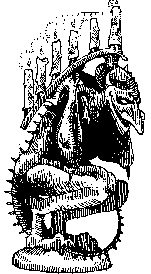| The World of Teréth End |
||||
|
"The space beyond is lit only by what light enters through the doorway. The far side of the chamber is shadowy which explains, in part, why you don't see his shape at first. A moment later his form comes into view; a massive Uren sitting on three (maybe more) chairs sits before you. Legs like pillars splay over the chairs from beneath his monstrous body. Giant hands mounted on the end of tree trunk arms and bearish shoulders hold a slim ceramic vase. The creautre smiles pleasantly as you enter. When he speaks you find his voice deep and resonant and engaging. "`From Taládan,' he says appreciatively. `Late empire porcelain, intricate brushwork, good condition, a fine vessel' he says glancing from the vase to yourself. `What would you pay for such a piece? Five, six thousand?' He smiles. `If you could, you would be cheating me.' He sets the piece down reverently in a blanket-lined crate, before collecting himself back onto his chairs. `I don't get many callers asking for me by name.' He nods his head, which more slides into the confines of his neck and chin, rather than making an independent motion. `Worron said you had something of a, personal nature to discuss?' " Oth. Fourteen. 29 Jun 1995 |
Book of Equipment & Money
The Dekàlan Empire was once a crucible of people, produce, and coin. Today, the ruins of the empire retain only a weak shadow of their former prosperity. Goods from foreign lands are now met with great excitement and surprise, begging outlandish prices. The corals of Azàlari may no longer found in northern ports, and finely tooled weapons and machines rarely find their way to southern ones. It is a time of scarcity and skepticism, where strangers are feared, not welcomed. Only the ubiquitous Dwürden seem immune from Uren suspicion, their relation with Dekàlans unchanged since before the Fall. Except in the most visited ports, availability is determined by local production and resources. Equipment Available materials vary widely from place to place. What may be desired or useful in one region may be useless in another. For these reasons it is necessary to know what is available in a given region. A steel sword may be purchased in Oth for instance, but unavailable in Kirydia where the secrets of steelworking are unknown. In addition, a composite bow might be desirable in Caphar, but unusable in Panath where the glue that binds the layers of bone and sinew would weaken and separate in the humidity. Coins Throughout most of Teréth End, three standard metals are used to coin money; copper, silver, and gold. Coin values vary greatly due to coin size, weight, and metal composition. In cosmopolitan areas prices are often reflected by metal weight and purity rather than number of coins. Such measurements are commonly made by moneychangers who are glad to make appropriate conversions for a cost. In the lands of Dekàlas, each city-state was given leave to mint a coin unique to that region. In some of these regions that right was transfered to the patron Temple. Worth of these unique coins differs from city to city. One of the most remarkable Temple coins is the Othic Orm, which is fashioned from a strange and "unworkable" iron ore. The secret of its fashioning is a closely held secret within the Temple of Roth. Other than the temple itself, a few holy relics, and items of importance (the High Lord's crown, sentinels, etc.), only the coins are made with Orm. Incomes Incomes vary by place and depend greatly on the local economy. Income is also dependant on the skill of the professional. Unguilded workers get paid the least, whereas guilded workers are more expensive to hire. In most situations, apprentices are not paid in coin, but rather given room and board by their masters and the wealth of knowledge gained from years of hard work. Hiring an apprentice requires approval of the master and some negotiated settlement of pay to the master. Unapproved payment to an apprentice is theft.
|
Goods & Services Equipment and services are divided by suppliers from which goods may be purchased Apothecary Coins The coins of different realms are detailed with their exchange rates Dekàlan Magical Items The Magical Items section outlines the powers and history of individual artifacts by category: Armors |
||
| Ref. PHB (Player's Handbook), © Wizards of the Coast  |
||||
 While
browsing through the sun-baked bazaars of
While
browsing through the sun-baked bazaars of